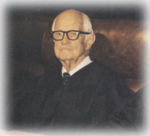Elbert Parr Tuttle
| Elbert Tuttle | |
|---|---|
 |
|
| Chief Judge of United States Court of Appeals for the Fifth Circuit | |
|
In office 1960–1967 |
|
| Preceded by | Richard Rives |
| Succeeded by | John Robert Brown |
| Judge of United States Court of Appeals for the Fifth Circuit | |
|
In office 1954 – 1968 (senior judge 1968-1981) |
|
| Nominated by | Dwight Eisenhower |
| Preceded by | (Seat established) |
| Succeeded by | Lewis Render Morgan |
| Senior Judge of United States Court of Appeals for the Eleventh Circuit | |
|
In office 1981–1996 |
|
| Personal details | |
| Born |
Elbert Parr Tuttle July 17, 1897 Pasadena, California, USA |
| Died | June 23, 1996 (aged 98) Atlanta, Georgia |
| Alma mater | Cornell University |
Elbert Parr Tuttle (July 17, 1897 – June 23, 1996), one of the "Fifth Circuit Four", and a Republican from Georgia, was chief judge of the United States Court of Appeals for the Fifth Circuit from 1960 to 1967, when that court became known for a series of decisions crucial in advancing the civil rights of African Americans during the Civil Rights Movement. At that time, the Fifth Circuit included not only Louisiana, Mississippi, and Texas (its jurisdiction as of 2012[update]), but also Alabama, Georgia, Florida, and the Panama Canal Zone.
Tuttle was born in Pasadena, California. In 1906, his family moved to Hawaii where he attended Punahou School. In October 1910, he and his brother Malcolm built and flew the first glider in Hawaii. Tuttle then attended Cornell University in Ithaca, New York, from which he graduated in 1918. He then fought in World War I in the United States Army Air Service from 1918 to 1919. Tuttle was the founder of the Beta Theta chapter of Pi Kappa Alpha Fraternity at Cornell and was a member of the Sphinx Head Society.
...
Wikipedia
